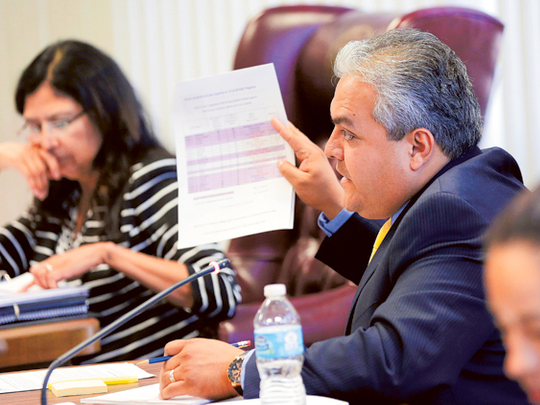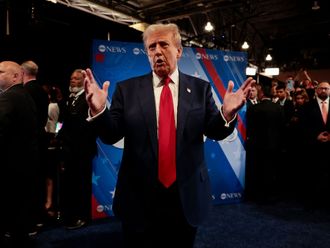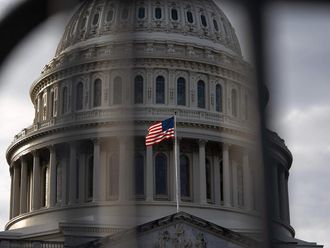
Los Angeles It is a demographic milestone signalling the changing face of America: Latinos have overtaken whites to become California’s largest racial/ethnic group.
They officially make up 39 per cent of the country’s most populous state, edging past the 38.8 per cent who are white non-Hispanic, and dwarfing the Asian American and African American communities.
Demographic ascendance is producing a fast growing ethnic voting bloc nationwide. The Latino electorate, which cast ballots in record numbers in the 2012 presidential election, is expected to double within a generation. “An awakened giant”, declared the Pew Research Centre.
So why, then, are Latinos taking a political hammering? Immigration reform, a priority for the community, is flatlining in Washington. Meanwhile the number of people deported under President Barack Obama is set to reach two million next month, far outstripping deportations during the Bush administration.
Frustrated activists and detainees are marching and fasting to protest what they call abandonment by Democrats and Republicans. Janet Murguía, head of the National Council of La Raza, the country’s oldest and largest Hispanic advocacy group, recently underlined the alienation by calling Obama, a supposed ally, “the deporter-in-chief”.
Stung by the criticism, the president met with Latino lawmakers last month and ordered immigration officials to review deportation practices to see if they could be “more humanely” enforced “within the confines of the law”. The move signalled a possible easing, but fell well short of activists’ central demand, that Obama use executive action to slow deportations.
For all the talk of ascendance, Latinos are learning a harsh truth: the “browning of America”, a phenomenon trumpeted for decades, has yielded slow, uneven results. Hispanic political clout lags at the local, state and national levels.
“Demographic triumphalism masks economic, organisational and structural weakness,” said Roberto Suro, a Latino affairs scholar at the University of Southern California. On election day 2012, there were 53 million Latinos in the US — 17.2 per cent of the population. But they accounted for just 10.8 per cent of eligible voters and 8.4 per cent of actual voters. Furthermore, half lived in Texas and California, which don’t swing in presidential races. Democratic and moderate Republican leaders know all this, and so largely pay lip-service to latino concerns, said Suro. “It’s all about voting, where you vote, and the next election.”
Mark Hugo Lopez, director of the Pew Research Center’s Hispanic Trends Project, said demographic growth did not translate into equivalent political heft. “Latinos are punching below their weight.” There are very few districts where Latino votes could make a difference in November’s congressional elections, he said.
Latinos have seemed on the verge of breakthrough for the past decade. George W Bush courted them in 2004, neutralising though not eliminating the Democrats’ traditional advantage, and snatched battleground states like New Mexico from John Kerry. Bush tried but failed to deliver immigration reform.
Latinos rewarded Obama’s outreach in 2008 by arguably delivering him as many as eight states and 80 electoral college votes. Four years later they helped him keep the White House. A record 11.2 million Latinos voted in 2012, and they broke for Obama over Mitt Romney by a margin of 71 per cent to 27 per cent, keeping swing states like Colorado and Nevada blue.
It seemed Latinos’ time had come. Obama promised to champion immigration reform in his second term. Chastened Republicans spoke of reaching out. The Senate passed a bill.
Then the momentum faltered. Conservative Republicans in the House kiboshed reform. Now, there is a consensus that this year won’t see any changes, and the president said he was powerless to staunch the flow of deportations.
Latinos cannot blame these defeats solely on GOP radicals, said Arturo Vargas, executive director of the National Association of Latino Elected and Appointed Officials. “As a community we’re still developing, maturing. With every electoral cycle Latino political impact is increasing but we understand there is much more to do.”
Of 53 million Latinos, seven million are undocumented immigrants, five million are legal immigrants who are not citizens and cannot vote, and 17 million are too young to vote (for now). That leaves an electorate of just 24 million, of which less than half votes, compared to around two-thirds of whites and African Americans.
Many factors impede political mobilisation. One is youth. The median age of Latinos in the US is 27, and just 18 for those born in the US. And like people of other races, they tend to pay attention to politics later in life. This means the 50,000 Latinos who turn 18 every month may take more than a decade to make an electoral impact.
Insecurity about English and institutional weakness also discourage voting, said Arturo Ybarra, founder of Watts/Century Latino Organization, which seeks to harness the burgeoning Latino population in south-central Los Angeles.
African Americans are still the dominant political group in parts of south-central LA, such as Compton, despite the fact that they are now minorities there, Ybarro said. He attributes this in part to black Protestant churches providing “tremendous social and political machinery” in contrast to relatively feeble efforts by the Catholic church.
Middle-class Latinos show more political engagement but the financial crisis and education cutbacks hit the community especially hard, marooning many in poverty and debt. “How can you transition without resources and quality education?” said Ybarra.
There is no question Latinos have made big strides. Between 1996 and 2011 the number of Latinos serving in elected office rose from 3,743 to 5,850. That figure includes 24 members of the House of Representatives and two US senators: New Jersey’s Bob Menendez, a Democrat, and Florida’s Marco Rubio, a potential Republican presidential candidate.
With the Latino electorate expected to balloon from 23 million to 40 million by 2030, the number of elected and appointed officials will doubtless swell. Some think those advances justify optimism regardless of the gap between demographic and political power. “I would say the glass is half full,” said Hugo Lopez, of the Pew Research Center.
Vargas, who represents public officials, agreed. “We’ve had a significant impact on the US political system.” He lamented, however, that the electoral system entrenched obstacles. During campaigns both parties focused on those most likely to vote, to the exclusion of Latinos. “If you’re not in the game people don’t phone or knock on the door.” The fact that so many Latinos live in states that are not battlegrounds in presidential races also drains incentive to mobilise.
Lionel Sosa, a Texas-based media guru who advised Ronald Reagan, both Bushes and John McCain on reaching Latinos, said the community can swing outcomes when it comprises more than a quarter of voters and an election is very tight. “You could say Latinos elected (George W) Bush. He won 6,000 more Latino votes in Florida than Al Gore.”
Sosa agreed with Reagan’s famous claim that Latinos were Republicans who just didn’t know it yet — a reference to their social values and immigrant work ethic — but said both parties were now alienating them. Tea Party-tinged xenophobia sabotaged GOP outreach, he said. “Calling illegal workers an alien invasion which brings third world diseases like tuberculosis and leprosy, that’s a turn-off.”
Democrats pocketed Latino votes and took them for granted, said Sosa, but the clock was running out. Twice they voted for Obama and twice they were disappointed. “That says disrespect. So why vote for his candidates? Come the next election, it’ll make you want to stay at home.












